Issue Number 28, Spring 2015
Contents
- Elegy for the Giant Tortoises by Margaret Atwood
- After Watching Farlan's Cows by Dianne Oberhansly
- A Cry Breaks the Silence by CB Follett
- Arrowhead Catechism by Gail Thomas
- Fledgling by Susan Lanier
- Game Day by Barbara Crooker
- Heard Among the Windbreak by Cal Freeman
- Laguna Grande by Janet St. John
- Letters from the Hinterland #11, Springtime Wonders by Raymond Greiner
- An Awakening by Lowell Jaeger
- Migration by Judy Brackett
- Near Walden by Richard Jordan
- Pacific Garbage Patch by Meredith Ferrill
- Portfolio by Christopher Woods
- Spider Bones by Dan Jacoby
- The Gaia Theory by Gail Rudd Entrekin
- The Rabbit by Karen Sharpe
- Watching a Sloth by David Chorlton
- Tremolo by Marjorie Stelmach
Archives: by Issue | by Author Name

Elegy for the Giant Tortoises
by Margaret Atwood
Margaret lives near the Humber, Don and Rouge River watersheds in Ontario, Canada

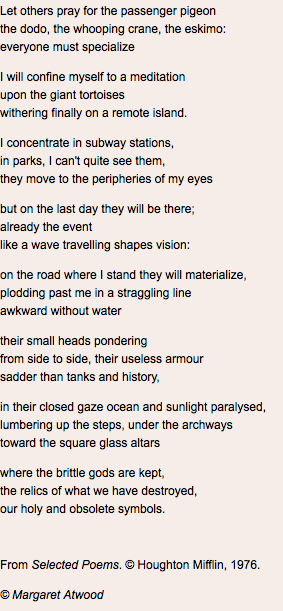
© Margaret Atwood
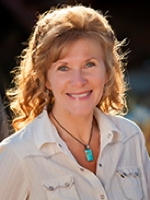
After Watching Farlan's Cows
by Dianne Oberhansly
Dianne lives at the base of 13,000 foot Boulder Mountain, part of the Aquarius Plateau in southcentral Utah, which is mother to around 80 lakes. Her favorite, a day's hike from her house, is Crescent Lake.

A green field is the world.
A post and wire fence is the greatest
mystery. Spring calves outrun
the wind, mimic freedom, acting like
small, happy drunks. This cow here
wears the shape of a dirty white
angel across her back and flank.
And this cow has lowered herself
onto the ground, a lover
of the earth, though the earth
does not love her in return. Black
manure is scribbled over the field,
an unreadable, fragrant alphabet.
Ruminant--such a pretty word, sounds
like it should mean a cool, gold-flecked room.
I am on one side of the fence,
the cows on the other. Metaphysics.
Something bitter and essential
to convey. I feel around
for the right word, lean deeply
into invention. Last week, almost
in this very same place, a woman
I know sat in her car, pastels in hand,
trying to draw the cows onto paper.
Four stick legs, barrel belly, a head
so large and sensuous and
sad, not even Billie Holiday
could sing its song.
© Dianne Oberhansly
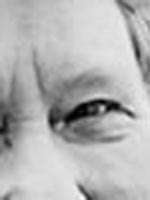
A Cry Breaks the Silence
by CB Follett
CB lives in the Mt. Tamalpias watershed in Marin County, CA.

Into the silence of dawn breaking open
there is a small sound, almost a cry,
lone and plaintive; enough to raise hairs
on your nape, enough to call you outdoors.
Only once
hanging alone in the lightening air.
Had you really heard it?
And then another, not quite as loud,
but insistent enough to lead you on.
There is the path of concern
and its shore of fear. The unknown
lies out in the silence —
We have a coyote in our neighborhood:
newcomer. Probably came down
from the Headlands and crossed the land bridge
over the freeway. We see it occasionally,
getting thinner, a little less steady.
Whatever cries in the silence needs to take care.
Cats and small dogs should stay closer to home.
Even the skunks and raccoons that come
for water or garbage need beware, and the deer
that tic tacs on the road looking for roses —
this is no place for any of them. Danger lurks
in the cultivated: cars, big dogs, men with guns.
Go back, I say, back to the ridge line between here
and the ocean. Plenty of rabbits and voles
for coyotes; berries and puddles for the others,
grasses and meadowlarks.
Whatever cries in the dawn silence is living
on borrowed time. So is the coyote. We are all
living on borrowed time. We are all making
those small cries at the breaking of the day.
© CB Follett
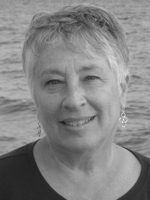
Arrowhead Catechism
by Gail Thomas
Gail lives near the oxbow of the Connecticut River along a flight path for hawks, eagles and herons.

You waited under knots of witch weed,
cradled in grub tunnels, heaved up
in winter, plowed in spring until
you landed at my feet.
If I hadn’t looked down
I would have missed your dull,
chiseled shaft, electric jolt in my palm.
Who made you?
God made me, I answered the nuns.
I saw you break
the surface of river, quick flash
of silver fin swerving
to miss
your best intention.
from Waving Book (2015, Turning Point/Word Tech)
© Gail Thomas
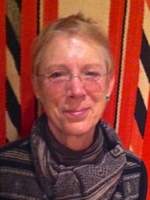
Fledgling
by Susan Lanier
Susan lives just above the Arroyo Chamisa, which offers passage to coyotes, bears, the spring-returning mountain lions; passage north to Sun, Moon and Atalaya Mountain or south to the sprawling, drier areas of high desert in the Santa Fe watershed.

hiding under the tarragon
he flopped out when spray
from the hose spattered
the leaves his tail awry
and one leg limp he gouged
his way through the mulch
with the elbows of his wings
mottled down pillowed his breast
had he plunged to stone? veered
into my window?
his beak gaped soundlessly
but no parent towhee arrived
her beak tufted with beetle legs
red ants would pry away
his flesh should he grow still
he persevered for hours and I
considered options but did
the deadly nothing
and later sprained my foot hiking
as if in retribution with such terrifying
implications that I like any fledgling
too soon flown am unqualified
to know
© Susan Lanier

Game Day
by Barbara Crooker
Barbara lives near the Little Jordan, a branch of the Jordan Creek, part of the Lehigh Watershed in rural northeastern Pennsylvania.

A crow, big as a linebacker, lands on the feeding table,
muscles in on the blue jays, redwings, and white throats
huddled there in this late March snowfall—Virginia,
where it really should be spring. The field is covered
with a white tarp, and every twig, branch, and limb
is outlined in white, a muscular filigree. Out
of nowhere, the cardinal blows his red whistle.
Previously appeared in Switched-On Guterberg
© Barbara Crooker

Heard Among the Windbreak
by Cal Freeman
Cal lives and writes in Dearborn, Michigan, in the Rouge River watershed.

To bow with snow and mercury,
to stagger on shallow roots, to green
the needles on these arms and shed them,
to stand between the cold and you.
This is crop milk in a wren’s throat
with no young to feed, grass blades
and garbage gummed with spit.
In the shadow of a derrick,
this is bitterness and home.
Strung with multi-colored flags,
spruces surround the backflow ditches
where the heron drink and sicken.
Skin the saffron color of the sand,
wrinkled like the paper sack
that holds the bottle, to be an old man rolling
Beech Nut over a blue tongue (the tongue,
that bellwether of splendor and disease),
listening to the branches sigh
and the meters on the jutting pipes tick,
spine curved like a taproot, smell of sick
river in the burdock whose root tincture
is said to cleanse us of abuse. When this
was a park, children with dirt-smudged faces
would watch from the trestle bridge
as carp fought over the popcorn
and breadcrumbs sprinkled in brown water.
Now halogen light obscures dim
parabolas of stars whose names
I never knew, and razor wire glints.
To stand up while the chemicals roil
and the bedrock fractures,
to feel that and not fall, to be a soul
full of mourning doves and shudder
with startled wings as they rise.
© Cal Freeman
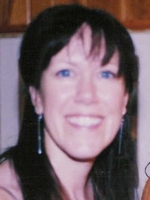
Laguna Grande
Bioluminescent Bay, Puerto Rico
by Janet St. John
Janet writes and takes a lot of walks with her dogs in the Sandia foothills, up from the Rio Grande-Albuquerque Watershed.

Look, the sky is sparkling
overhead. And below the dark
water, black as new moon
night, illuminates when we wave
our hands through it. We wizards,
stirring the liquid pot to life. Fragile
plankton born of perfect womb-
warmth, lack of manmade, glaring
light. Ideal conditions. This bay
one concentrated echo of daylight.
We had to travel to reach it.
Pitch-black through the narrow
mangrove channel. Trying to avoid
jutting roots, clawing, stabbing,
low-grabbing branches.
The real journey between us.
You in back. Me in front.
Me, more night-adapted.
I called out the rhythm,
right-left, you couldn’t follow.
I wanted to just get through
all the darkness to the gift.
Because I was tired of paddling
my kayak-life through danger
and obstacles, with uncommunicative
guides, who had navigated this
waterway so many times they could
paddle in their sleep and not slam
into gnarled tree trunks, not nearly
lose an eye. They didn’t need eyes.
They saw in their minds’ eyes.
The right bend here, paddle-paddle left.
The narrowing, other tours, irregular
kayak chains heading toward us
in the blind night. Somehow we avoided
collision in tunnel-dark, going in and out.
But lights on one hill shocked us
back to knowing how light
pollution can damage this place
irreparably. And should it disappear,
should we still be in these bodies,
in this world, when it does,
we would remember. We would
say, Thank God, we saw it.
Before it went extinct, before we killed
another beauty born like love
so naturally, magically. We will remember
because the journey was harrowing,
seemed to test every patience,
each fear, our trust in one another.
The two-person paddling. The sync
of minds and bodies. It took so long
to get here, to find the place,
stir it to luminescence, and take it in.
© Janet St. John
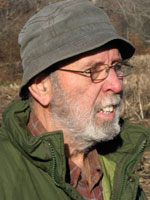
Letters from the Hinterland #11, Springtime Wonders
by Raymond Greiner
Raymond lives with his canine companions Orion and Venus on 14 acres of remote forested and pasture land about three miles from the hamlet of Paragon, Indiana, in a cabin about 500 yards from the little-traveled road.

The vivid contrast of winter and spring begins to elevate in April. 10 days into spring and we had six inches of wet snow, such a difference yesterday. 60 degrees and sunny. Like welcoming home an old and dear friend. The quiet bliss of the place where I live adds dimension to this most welcome scene. Small leaves appearing on thorny plants, crocus and daffodils add delightful color and the pasture is turning its typical ultra-green. Even those that hold their spirits high during bleak months of cold wind and snow are spiritually heightened with this blessed season.
We found a tiny kitten in the hay barn in late fall. I kept her in the workshop all winter and she is such a joy. Now she lives under my cabin and after a few days of fear she has adjusted totally. Orion, Venus, Fluffy Cat and I serve as her audience as she presents an ongoing performance on "how to be a young cat." Jumping and feigning attack with her back arched upward. She plays "cat hockey" with hickory nuts, as Orion and Venus watch her with interest trying to figure out exactly what she is doing. A chorus of spring peepers join in creating a surrealistic performance emitting a demonstration of something I am unable identify accurately. Orion has his Frisbee session each afternoon and the kitten watches in amazement, then joins Venus at the woodpile to search for mice or some other buried critter. These activities are ongoing. This place is a cat and dog paradise, endless smells and places to run. Orion is the most likely candidate to learn to read and write and I'm hoping to teach him soon so he can write a book titled The Good Life of a Dog.
I would have great difficulty living in an urban zone again. The smell, noise and congestion of the city that I endured during my business career seems like a distant place. Stress is absent here. We humans are champion adjusters, adapting to our environments. People cling to cities and urban zones for a variety of reasons, a habitual activity for thousands of years.
Four deer linger daily in the woods behind my cabin. The resident pair of geese fly from pond to pond in vocal flight. The daily presence of nature allows a certain balance to one's life.
Sara Rauch the editor and publisher of Cactus Heart Literary Journal sent me an e mail yesterday describing how she is striving to reduce the clutter in her life, but to her dismay she had mistakenly discarded a book she wanted to read. Clutter is a nemesis that bedevils most of us to some degree. It seems to take on its own life form, expanding and accumulating, becoming a monster of sorts. Nature's critters are uncluttered, embracing a simplistic approach to life's functions.
I was distraught early in the week from the news of my cousin Billy Ray's death. I had not seen him in over 40 years, but somehow the pain of this news impacted me to a higher degree than I could have anticipated. He was a large presence in my life during my early years, and this likely is the reason for the degree of pain I suffered. In later years formative years seem to glow brighter than in mid-life. I took the day off and hiked my favorite trail in the state forest, a three mile loop. It served me well as a method of coping. Much of life is coping. Nature is a healer and its power mesmerizes me. The voice of despair can sing in a variety of rhythms and tones often out of key and off tempo, like a catbird singing in a thorn bush. Then the sky opens and darkness becomes light as clouds of doubt vanish.
Dysfunction continues to plague our world. Has it not always been so? This repeating performance of war talk and political posturing to gain positions of power and prominence seem boundless. The value and joys of life are found elsewhere. Will we ever, as a species, discover that "elsewhere"?
From the hinterland
© Raymond Greiner
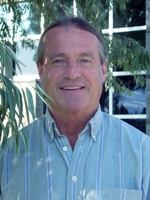
An Awakening
by Lowell Jaeger
Lowell lives and writes on the shore of Flathead Lake (the largest freshwater lake in the continental states west of the Mississippi) in the center of the Flathead River Basin. He spends his summers hiking in the nearby Bob Marshall Wilderness and Glacier National Park.

It’s quiet as death. Till a renegade wolf in the dark
scents his prey. Dances under starlight and howls
a quarter mile away. Chills the forest
a blacker black. You blink. Listen. Stare.
The pulse of your empty house skips a beat.
In the barn, the horses nicker and kick.
The mare, ready to foal, paces sick
with fear, panting, soaked in sweat.
So you lace your boots and snipe out there
toward the yawning ache of the hungriest
need in you to face whatever prowls
with cleft foot, claws, or Satan’s bark.
Just beyond the fence line you find the track.
Yours are acres the wild wants back.
© Lowell Jaeger
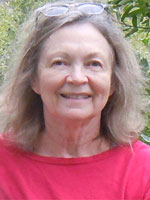
Migration
by Judy Brackett
Judy lives in the northern Sierra Nevada foothills just uphill from Deer Creek and minutes away from the South Yuba River.

In the cold twilight, Sandhill Cranes gather in cornfields along the river, the beautiful, the beautiful river, countless flocks of ten or twenty or more, gleaning snacks from crop stubble before lifting off and settling on sandbars in the frigid waters of the Platte.
On the icy bridge a hundred yards away, seven silent watchers gather, their noses burning and dripping, fingers numbing, and set up tripods and fancy cameras (no flashes allowed) while the cranes fidget, making gargly, warbly noises, elbowing one another, checking on their mates and their spindly-legged young —colts, they’re called—watching the watchers, and finally quieting as the March darkness deepens, enveloping the thousands of cranes, now one inky, shifting mass in the shallow depths.
Before first light the watchers are back again to spy as the cranes awaken and shuffle about until the sky is right and they rise from their marshy roost in a cloud, one whooshing ululation like angels on their way to some kind of crane heaven or just to cruise to nearby fields to feed another day or few, and then in great herds, like upside-down cyclones, soar to the thermals, gliding and riding them north, miles and miles of sun-frosted ribbons.
If Sandhills had four legs, they’d be horses, Pegasi. Their lightning—silver shooting through blue, their thunder—echoes of nine million years of wingbeat and song across the plains.
Earthbound, the watchers are left to wait another year, admiring their beautiful, flat photographs. And the shallow Platte abides, still and shining.
© Judy Brackett

Near Walden
by Richard Jordan
Richard lives in the Nashoba Valley in Eastern Massachusetts not far from the Nashua and Squannacook Rivers

Clouds of mayflies
hover above a quiet pool.
Shadbush spices the air.
White petals swirl
& flow toward the falls.
Still nothing breaks the surface.
No tug that means a fish
is on the line.
Upstream a solitary swan
holds motionless near the reeds
like a shadowed question mark.
© Richard Jordan

Pacific Garbage Patch
by Meredith Ferrill
Meredith lives two miles inland from the vast freshwater basin of Lake Michigan, which provides drinking water to millions, on the banks of the heavily polluted Chicago River.

In the daytime, I picture
ocean liners cutting through
the islands of plastic, scattering
neon wrappers and bottles floating
like uneaten Cheerios on the
cerulean skin of water, and
it all doesn’t bother me as much.
Under sunny skies, I imagine
scientists scooping samples from
the vast expanse of clipping waves,
gathering jars of milky debris
suspended in salt water.
I picture men and women in
broad-rimmed hats, swirling
the waste within the jars, piping out
eye-drop-sized amounts
to study later in their labs.
In my vision, there is so much
activity—marine life cut free from
synthetic rope, encrusted snails
rescued from their suction on
discarded soda cans. Men and
women holler to one another,
tossing back turtles they’ve un-
tangled. Engines roar as the
vessels start up, return to shore
with new knowledge.
*
But in the nighttime, lying awake,
I feel the Patch grow: bottles
swim across unwatched seas,
pulled by deep and swirling
currents, join the breathing mass.
En route, new recruits bob
and twist, gleaming against
the moon’s light like clear,
unclosable eyes.
At night, the Patch is alone,
unchecked as it swells, beating
its plastic heart, riding
the silent, moonlit tides
like seals come up for air.
Submerged bottle caps break
loose from the titanic
underbelly, and either sink
to the depths or are found
by brown pelicans coasting
through the indigo waters.
I see the birds peck
at lotion tops, their beaks
clamping on what
they think is food—
old contact cases,
toothpaste lids, ripped
take-out sacks
drifting just under
the dark waves.
What is mistaken
for prawn or
flounder
will live on
in the ribs
of the dead bird,
years after
feather and flesh
have decayed.
© Meredith Ferrill
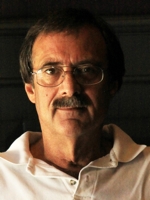
Portfolio
by Christopher Woods
Christopher lives in the Lower Brazos watershed. His bungalow is one mile as the crow flies from the Brazos River, in an area where opossums, armadillos and wild hogs maintain their own kingdoms.

The house stands at the end of the road, near a river. He stands in the night street appraising the house, the ghost glow, the promise, a hopeful omen. He gathers his bags with the tools of his trade and begins to climb the front stairs when he hears the cry from inside. A child’s wail, loud and desperate.
A haggard woman opens the door and shows him inside. A weary smile on her face, she seems too old to be the child’s mother.
“Thank you for coming,” she says, and she tries to stifle a deep cough. “My son is upstairs. I think it is almost time.”
“I hurried. I had a feeling,” he says. But he does not tell her how he stopped several times along the river road. Such a strange thing, the sight of glowing trees. Even the grass seemed lit. He had stopped to take photographs.
“You’ve seen the trees,” she says. “I can see it in your eyes.”
“I have.”
“Wasn’t always this way. But the people started their work up river. Nothing is the same now.”
The stairs are narrow, but strangely illuminated, though he can’t see a light or a lamp, a source. Once they reach the second floor, he feels as though they are drifting toward the room at the end of the hall. It is a dizzying thing, but he takes it for what it is. He holds his camera close to his chest in a protective way.
When they enter the bedroom, he sees the boy, all aglow, on top of a quilt of many colors. He sees that the quilt is a pattern of trains, the old steam engine kind. The steam rises from the train engines and gathers in clouds near the ceiling. The clouds glow softly. The trains and the clouds are not going anywhere in the small room. Yet.
“Should I stay?” the mother asks.
“It’s fine,” he says. “What is the boy’s name?”
“Isaac.”
She again stifles a cough, then backs toward a window to make room for him to do his work. She folds her arms tightly around her chest. With light from the window behind her, he sees that the boy’s mother is translucent. Her bones are visible and white. They shine through her woolen sweater and pants.
“Isaac, I have come to make your memory portrait,” he says soothingly.
“Yes sir,” the boy whispers, obviously in pain. “But I might not smile.”
“I understand. Just relax and I’ll be finished soon. Then you can sleep.”
He can feel the boy’s fever in the air, but he does not back away. Instead, he carefully takes the camera from its case and begins to focus on the glowing boy, the white effervescent sheets, and the smoking quilt. As he does, he wonders how soon he will return to this house on the river road, to take the memory portrait of the mother. He is not good with time, but he thinks it has only been a month, or maybe six weeks, since he was there to take the memory portrait of the boy’s father. And maybe four months since he began the memory portrait series of the river people.
“Smile for me, Isaac.”
But the boy merely stares blankly into the camera. Dazed, all of them.
These river people do not pay him for their portraits. Instead, he receives envelopes of cash from someone he does not know, a person who wishes to remain anonymous. His work at the camera store as a clerk doesn’t pay much, so he has begun to appreciate the cash from the mysterious stranger. He has puzzled over this, who the employer might be and what it all might mean, but he has become so busy taking the memory portraits that he has almost stopped thinking about it. What he can be sure of is that he is living better because of the cash, though he is unsure how long he has been receiving it. Four months? Five?
As he clicks the shutter, he feels that numbness in his fingers again. The numbness comes and goes, but lately it has become more pronounced. His skin also seems much paler than before. When he is finished taking the portrait of the boy, the mother steps toward the bed. She strokes the boy’s forehead. Her bony hand moves like a soft light across the boy’s face. The boy’s eyes are closed now. He is gone. Elsewhere.
“I’m sorry,” he says to the mother. She nods and lowers her head. She is quickly becoming accustomed to this, to grief.
He leaves the house and walks to his car. He looks up at the stars. They have become more and more faint lately. The grass and trees have slowly become brighter. He wonders what is happening up river. So far he has not tried to investigate. If he does, he might lose his job. The only instruction he has received from his mystery employer is to take the photographs at designated houses, but to never drive up the river road. So he has not, nor has he asked anyone about it. He has wondered all along if he should ask someone, if he should drive up the river road. Down deep, he has wondered if his employer is some kind of mass murderer, a wealthy one who is collecting memory portraits for a private exhibition.
As he starts the car, he notices another change in his hands. His fingers are now ghostly things, nearly translucent. He drives a mile or so and then pulls to the side of the river road. His first impulse is to keep driving up that road, to find out what is happening upstream. First, though, he must do something else, something important and lasting. He takes out his camera again. He takes a self-portrait.
© Christopher Woods

Spider Bones
by Dan Jacoby
Dan's family has lived in Macoupin County, Illinois, for about 165 years. Western Mound has Bear, Lick, Hodges, and Solomon creeks emptying into Macoupin Creek which flows into the Illinois River and eventually into the Mississippi River just above Alton.

one morning recently
reaching for the alarm
there behind the disc player
the body of a dead spider
legs curled up
body airy light faded
how many times
had he traversed my pillows
shook my hands
crossed my brow
never once did I take notice
miles he must have logged
hunting protecting me
move in book classics about him
creating a sepulcher of sorts
nights I hear his ghost
whispering a white noise thank you
for having noticed
Previously appeared in The Vehicle.
© Dan Jacoby
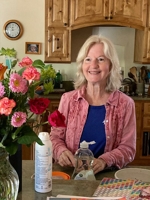
The Gaia Theory
by Gail Rudd Entrekin
Gail lives amid the Coastal Range east of San Francisco Bay in the San Pablo Bay watershed just above San Pablo Creek on lands of the Chocheno and Karkin Ohlone people.

Earth is a being. It shrinks and swells, rearranges its shores
nipping back on an island here, a cliff top there, subtracting
two yards of real estate from an Ohio yard, depositing that much
sand on Canadian shores. Shaking its skin like a wet dog, whole
forests tumble, winds lift, howl, spool, fling houses and cows
into neighbors’ pastures; lava burns to the surface, slips
down and across the roads, leaving its black trails; water
falls from the sky, some of it sinking deep under the surface
where it forms a tap-able layer; the rest, turning into a lighter,
thinner form, rises back up, clusters in myriad shapes and colors
around the planet, providing a blanket that holds it all in, prevents
invading heat from wrecking everything. And while this magic
is performed, this vast unfathomable system of checks and balances,
creatures made of the planet arise, respire, eat each other
and whatever else they fancy, fall back into the mulch.
And the planet, all this time, turns reliably, day upon night,
hurtles through infinite space, imperturbable, so far.
© Gail Rudd Entrekin

The Rabbit
by Karen Sharpe
Karen lives in the foothills of Mount Wachusett in north central Massachusetts on a small farm that abuts the Wekepeke Watershed, a tributary to the Nashua River.

Damp with the dog’s saliva
the rabbit, no bigger than a heart,
fur exactly the color of sandy loam,
trembled softly in my hands.
I tried, but found nothing in common
to say, and I could not offer
to surrender to its pain, to shape shift
and live those last moments in my own
calloused palms, knowing already
there would be none but a wretched end for this.
And, I did not even try, as if
a life so delicate could be wooed,
back from its wounding,
with a prayer of breath near its little nose.
So much wrong in this,
this expecting of godly things in our own doings,
conjuring our own resurrections,
unhurting the hurts among us,
offering a prayer of forgiveness, for the dog,
For her foul jaws and their lusty hunger,
for me, for the mere words I cannot speak,
for my mortal weakness,
this wonder of spirit I keep seeking to find.
A flight of sorrow and dreams, then,
joined among the wings of the clouds,
while I trudged off behind the garden,
my own scowl a curse upon my face.
Death does not become me.
I do not need to be told so
as the chemistry
of my inner life is rewritten.
For hours later,
from the lowest branch
of the maple in the corner yard,
the mockingbird’s
constant song is a reminder
of the ghosts of the regrets
your life has given you
and those you have yet to utter.
© Karen Sharpe
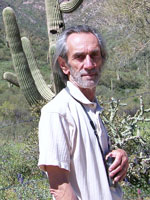
Watching a Sloth
by David Chorlton
David lives close to the Sonoran Desert in central Phoenix in the Lower Salt Watershed, at an elevation of 1,124 feet with an average annual rainfall of 7.7 inches.

The common view of a sloth
is from the ground, looking up into the leaves
where it lives above time
and a human hour is meaningless
to an animal slung on a bough
below eagles and above ocelots,
who risks the descent
every eight days
to deposit a cake on the ground
where the moths who inhabit
its fleece lay their eggs. Theirs
is an arrangement perfected
through millennia
by which the moths pay back
for where they live
with algae for the sloth to lick
and digest, as slowly
as the leaves that take
thirty sunsets to pass. The sloth
picks what it needs,
eats and breeds, exists
at the pace of waiting,
cradles its young and offers little
to see for observers,
outside of the face
when it turns to look
at whatever is looking
at it, and because of the permanent
smile and eyes
we might think
express contentment
at leading a gentle life,
it appears, from where we stand,
to be floating through a world
of green rain, where it is possible
to hang from Heaven by three toes
on each foot and need nothing
that is ever out of reach.
© David Chorlton
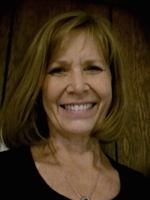
Tremolo
"For one species to mourn the death of another is a new thing under the sun."
– Aldo Leopold
by Marjorie Stelmach
Marjorie lives just below the convergence of the Missouri and Mississippi Rivers where repeated widespread flooding and urban expansion prompted the forming of a Conservation Partnership which has since implemented the setting aside of 21,000 acres of private land and enhanced 8,000 acres of wetland habitat for migratory and nautical birds.

It’s less often now
that a late spring dusk will tender
over these darkening waters
a loon’s otherworldly call—
sixty million years of loon song, brought
to perfection in tremolo—
to which my heart answers
lorn, answers, yore,
answers, ruth, erstwhile, thole—
long vowels in a language more and more
bereft of meaning.
⬩
Hoarding a hollowness in its call,
the loon alone among birds,
grew solid bones
evolved to match the density of water—
an equivalence
both boon and oblation,
the ease of the long dive bought at the cost
of swiftness in lift-off—
a fragile balance
I hear in the cry
that rises from glacial lakes
to lave and shiver my human marrow
with premonitions
of a future in which
my specie’s calls will haunt the Earth
rising from silvery disks
left spinning in our wake, filling the darkness
with saxophones, cellos, violas,
stirring a future specie’s blood
with hauntings older than its own:
⬩
That all calling
is calling to an Other who has never answered, this
is the Sorrow itself,
a honing of the heart, both boon and oblation:
our capacity for grief evolved to equal
our capacity for longing.
Tonight, it seems likely to come in my lifetime,
Earth’s last loon call:
one more hurt in time’s long harrowing—
a cry from the dark
to which our language
may own no answer.
© Marjorie Stelmach